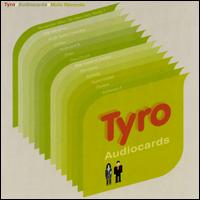
Tyro
Audiocards (Mute)
by Marc Hirsh

Tyro
Audiocards (Mute)
by Marc Hirsh
originally published in Space City Rock, Spring 2001
From humble beginnings, sometimes great things grow. Don't get me wrong: Tyro's Audiocards is the humble beginnings. But it has signs of life that explode all over the place. At turns odd and beautiful, dissonant and soaring, and sometimes all of the above at once, the Atlanta group's debut is spiked with electric jolts that provide surprise and a soul to their electro-punk scientist pop.
I'd guess that's mostly due to Katie Hartley's voice, which in pitch and timbre replicates nothing so much as the sound of her synthesizer, cool, eerie and vaguely robotic. Without her, Audiocards might be nothing more than ear candy. Like Susan Sarandon in The Rocky Horror Picture Show, Katie doesn't possess musical-theatre vocal talents; unlike Sarandon, she's not actually in a musical and thus doesn't have to worry about it. Locating the perfect frame for her imperfect instrument, she shines in disparate contexts. The drum freakout of "Lonely" betrays the thinness of her voice by bolstering it with cacophony, while the slow and beautiful "Grey Clouds" is relatively stripped down, a sad, nearly five-minute pop song in 3/4 time that a singer with a more powerful voice would have ruined.
The rest of Tyro, meanwhile, keeps things moving briskly, banging through garage rock of a type (and density) that didn't exist before the advent of computers (although there are times, especially at the end of "Shadow," that guitarist Skipper Hartley reminds me of Mick Ronson, of all people). The songs are occasionally science experiments more than anything else; not only is "Blameless" sung through a walkie-talkie, the entire second verse consists of two Katies communicating across the left and right channels. Later on, the resignation story of "Over the Moon" ("She left without a word...") unfolds over what sounds like, but is most definitely not, a preprogrammed drum beat from a $90 portable keyboard, and the distorted electric guitars of the chorus act not as vocabulary but as punctuation (an ellipsis, if I had to pick which one).
The album closes smartly with its best track, "Remember When We Were Very Young?," an instrumental that seems to update the Tornadoes' "Telstar" by throwing out the crappy bits (which were most of them) and hurtling the remainder headlong into the not-too-distant future. The shifting time signatures, repetitive synth bass and diamond-hard guitar make it interesting; the simple and indelible melody line make it brilliant. Not all of Audiocards is up to that level, but the songs that aren't drift by innocuously enough, so I see no real need to elaborate. If, in the middle of weirdness, perfect little moments spring up, then, well, they're still perfect. Which frankly puts them light years ahead of most humble beginners.